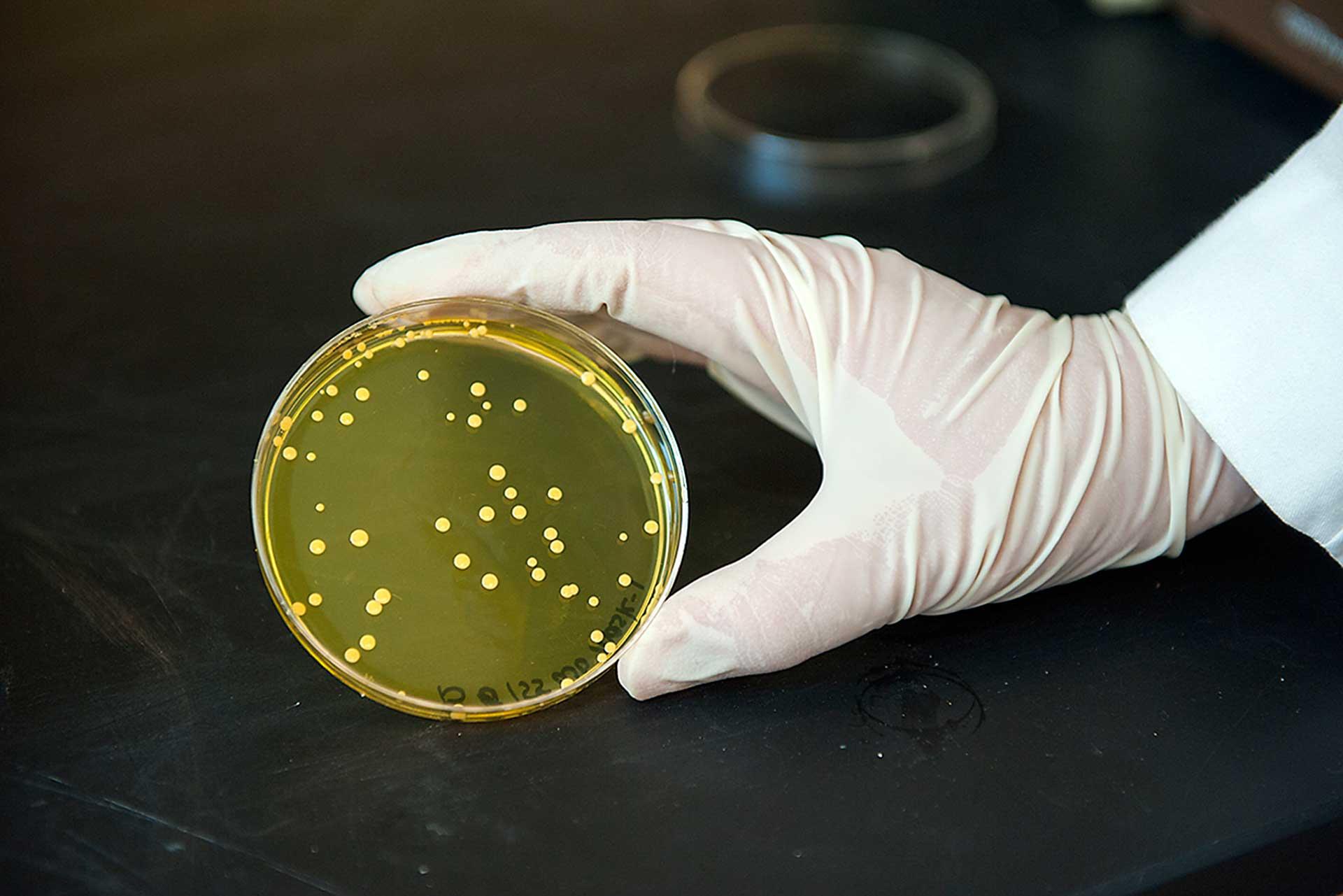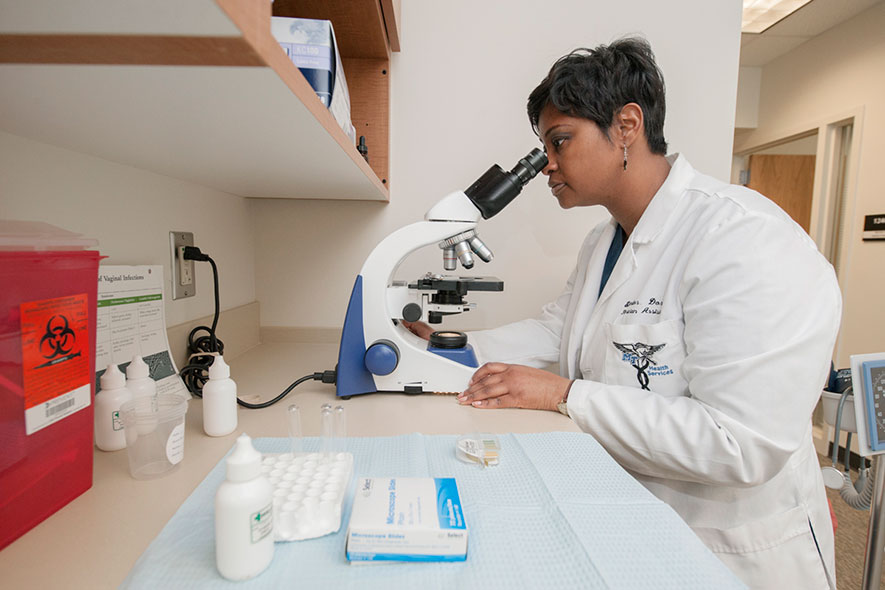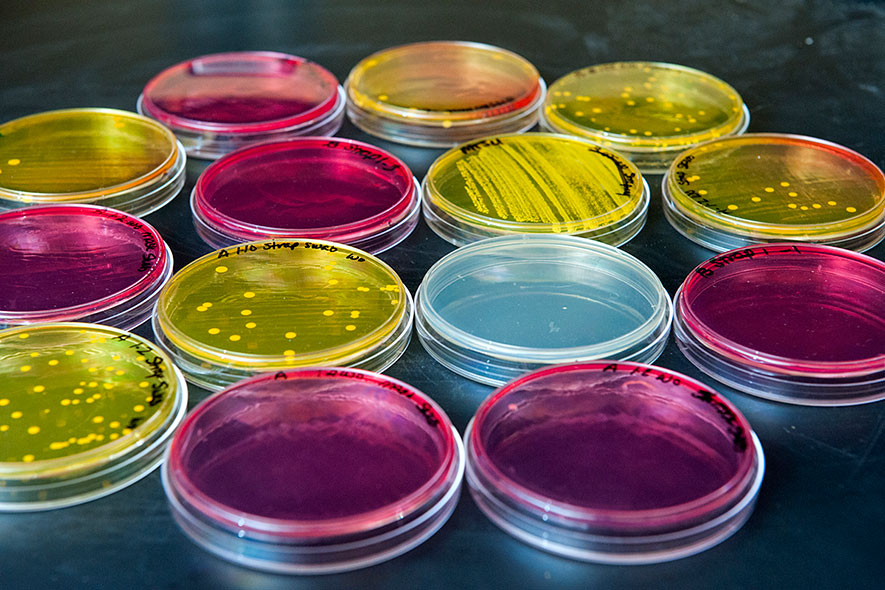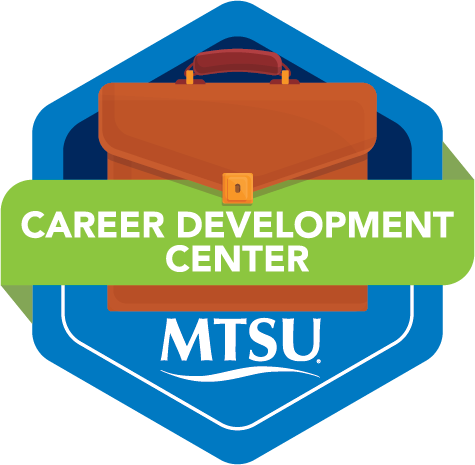
Science
Prepare for a great career in the health professions. Your path to professional excellence starts here.
Science, Allied Health Science Concentration, B.S.
The Science major, Allied Health Science concentration, is designed for students who expect to enter a professional school for cytotechnology, chiropractic medicine, pharmacy, or medical laboratory science. It may also be used for students interested in occupational therapy, or physical therapy.
For some programs, the Allied Health Science concentration leads to an MTSU degree through completion of at least 90 credit hours at MTSU, acceptance into a professional school, and either successful completion of one year or completion of the professional program (3+1). A four-year major in a standard science major such as chemistry or biochemistry is encouraged for students considering highly competitive health fields such as medicine or laboratory-intensive work. Admission to the MTSU pre-professional program does not assure admission to a professional program. However, MTSU committees and advisors support students in their application. Selection for admission is competitive and is made by the admissions committee of the respective program according to its selection standards.
News Briefs

The value of shadowing
All of MTSU's Health Science Pre-Professional Programs require a good amount of shadowing — of following and observing professionals in the field as they go through the daily routine. For many students, this requirement is also the experience that cements their determination to pursue their career of choice. Students in the Pre-Medical Technology program have the opportunity to shadow two hours a week at either Vanderbilt University Medical Center or the Veteran's Affairs Medical Center.

Be Pre-pared
Pre-Scripts is a pre-professional organization for students pursuing careers in the health sciences. The organization brings in local pharmacists, physicians, physical therapists, and other health care professionals, as well as representatives of schools and the armed services, to provide students firsthand insights into the different health science careers and valuable information about applying for health professional schools and programs. Pre-Scripts in also involved in community service projects and organizes trips to professional schools. (The organization meets on the second and fourth Wednesday of each month.)
News Briefs
The value of shadowing

All of MTSU's Health Science Pre-Professional Programs require a good amount of shadowing — of following and observing professionals in the field as they go through the daily routine. For many students, this requirement is also the experience that cements their determination to pursue their career of choice. Students in the Pre-Medical Technology program have the opportunity to shadow two hours a week at either Vanderbilt University Medical Center or the Veteran's Affairs Medical Center.
Be Pre-pared

Pre-Scripts is a pre-professional organization for students pursuing careers in the health sciences. The organization brings in local pharmacists, physicians, physical therapists, and other health care professionals, as well as representatives of schools and the armed services, to provide students firsthand insights into the different health science careers and valuable information about applying for health professional schools and programs. Pre-Scripts in also involved in community service projects and organizes trips to professional schools. (The organization meets on the second and fourth Wednesday of each month.)
Related Media

Science, Allied Health Science Concentration, B.S.
The Bureau of Labor Statistics projects a 28 percent increase in chiropractor employment opportunities between 2010 and 2020.
Allied Health Sciences Career Starters
MTSU offers a variety of Pre-Professional Health Science tracks to help put students on a path to a rewarding career.
- Pre-Chiropractic
- Pre-Cytotechnology
- Pre-Dentistry
- Pre-Diagnostic Medical Sonography
- Pre-Medical Technology
- Pre-Medicine
- Pre-Nuclear Medicine Technology
- Pre-Occupational Therapy
- Pre-Pharmacy
- Pre-Physical Therapy
- Pre-Radiation Therapy Technology
Allied Health Sciences Pre-Professional students have gone on to programs at
- Auburn University
- Austin Peay State University
- Belmont
- Creighton University
- DeBusk College of Osteopathic Medicine
- East Tennessee State University
- Logan University
- Medical College of Georgia
- St. Louis University
- Samford University
- Southern College of Optometry
- South University
- University of Alabama at Birmingham
- University of Health Sciences Antigua
- University of Louisville
- University of Tennessee
- Vanderbilt University Medical Center
- Western Kentucky University

MTSU’s Career Development Center
MTSU offers a comprehensive Career Development Center that serves students throughout the full student experience and beyond. They collaborate with faculty and staff to equip students with the tools to be marketable to the world of work and continuing education.
Students can schedule an appointment or check online resources and job boards at mtsu.edu/career.
Students can find current internship opportunities by talking to faculty and visiting the University job and internship board called Handshake.
Wondering what you can do with your major? Check out our What Can I Do with A Major In guides.

Science, Allied Health Science Concentration, B.S.
Andrienne Friedli, program coordinator
Andrienne.Friedli@mtsu.edu
Eric Miller, advisor
615-494-8894
EricB.Miller@mtsu.edu
The Allied Health Science concentration is designed for students who expect to enter a professional school for cytotechnology, chiropractic medicine, pharmacy, or medical laboratory science. It may also be used for students interested in dentistry, medicine, occupational therapy, or physical therapy. However, students interested in these areas should speak to their advisors about other major options better suited to their needs.
For some programs, this concentration leads to an MTSU degree through completion of at least 90 credit hours at MTSU, acceptance into a professional school, and either successful completion of one year or completion of the professional program (3+1). A four-year option is available and encouraged for students considering certain programs. For students completing a 3+1 program, a minimum of 21 semester hours of junior and senior (3000- 4000 level) courses must be completed at MTSU. Students choosing a four-year option must complete at least 36 credit hours of junior and senior (3000-4000 level) courses with an average grade of C (2.00 GPA) or better. With approval of the dean of the college, a student may complete 12 of the last 30 hours at another college or university or by CLEP.
Admission to the MTSU pre-professional program does not assure admission to a professional program. Selection for admission is competitive and is made by the admissions committee of the respective program according to its selection standards.
NOTE: A grade of C or better is required on all transfer credits accepted as part of a major or minor in the Department of Chemistry. Students must have a grade point average of at least 2.00 on courses counting toward a major or minor in any of the department's programs.
Academic Map
Following is a printable, suggested four-year schedule of courses:
Degree Requirements
| True Blue Core (TBC) | 41 hours |
| Major Requirements | 44 hours* |
| Supporting Courses | 20-21 hours* |
| Electives | 14-25 hours |
| TOTAL | 120 hours |
*This program requires courses that can also fulfill requirements of the True Blue Core curriculum. If program requirements are also used to fulfill True Blue Core requirements, the number of elective hours will increase.
True Blue Core (41 hours)
requirements (shown in curricular listings below) include courses in the Foundational Skills areas of Written Communication (WC), Information Literacy (Info Lit), Non-Written Communication (NWC), and Quantitative Literacy (Quant Lit). Knowledge Domains include Human Society and Social Relationships (HSSR), Scientific Literacy (Sci Lit), Creativity and Cultural Expression (CCE), and History and Civic Learning (HCL), which include Discovery and Explorations categories. Students must choose at least one course from each Discovery category.
The following courses required by the major meet True Blue Core requirements:
Major Requirements (44 hours)
- CHEM 1110 - General Chemistry I AND
- CHEM 1111 - General Chemistry I Lab (may be counted in the True Blue Core)
- CHEM 1120 - General Chemistry II AND
- CHEM 1121 - General Chemistry II Lab
- CHEM 3010 - Organic Chemistry I AND
- CHEM 3011 - Organic Chemistry I Lab
- CHEM 3020 - Organic Chemistry II AND
- CHEM 3021 - Organic Chemistry II Lab
- CHEM 3530 - Principles of Biochemistry AND
- CHEM 3531 - Principles of Biochemistry Lab
- OR
- CHEM 4500 - Biochemistry I AND
- CHEM 4510 - Biochemistry II
- BIOL 1110 - General Biology I AND
- BIOL 1111 - General Biology I Lab (may be counted in the True Blue Core)
- BIOL 1120 - General Biology II AND
- BIOL 1121 - General Biology II Lab
- BIOL 2230 - Microbiology AND
- BIOL 2231 - Microbiology Lab
- BIOL 3250 - Genetics AND
- BIOL 3251 - Genetics Lab
- BIOL 4300 - Immunology AND
- BIOL 4301 - Immunology Lab
- PHYS 2010 - Non-Calculus-Based Physics I AND
- PHYS 2011 - Physics Problems Laboratory I
Supporting Courses (20-21 hours)
- MATH 1530 - Applied Statistics
- MATH 1730 - Pre-Calculus (3 credit hours may be counted in the True Blue Core, 1 credit hour remaining)
- BIOL 2010 - Human Anatomy and Physiology I AND
- BIOL 2011 - Human Anatomy and Physiology I Lab
- OR
- BIOL 4110 - General Physiology AND
- BIOL 4111 - General Physiology Lab
- BIOL 2020 - Human Anatomy and Physiology II AND
- BIOL 2021 - Human Anatomy and Physiology II Lab
- OR
- BIOL 3340 - Human Pathophysiology
- MATH 1910 - Calculus I OR
- Pre-professional-approved elective 3 credit hours
- BIOL 2000 - Orientation to the Medical Lab AND
- BIOL 2001 - Orientation to the Medical Lab Field Experience Lab
- OR
- Pre-professional-approved elective 3 credit hours
General/Upper Division Electives (14-25 hours)
- See advisor for recommendations
Curriculum: Science, Allied Health Science
Freshman Fall
- Written Communication 3 credit hours
- MATH 1730 - Pre-Calculus (Quant Lit)
- BIOL 1110 - General Biology I (Sci Lit) AND
- BIOL 1111 - General Biology I Lab (Sci Lit)
- CHEM 1110 - General Chemistry I (Sci Lit) AND
- CHEM 1111 - General Chemistry I Lab (Sci Lit)
Subtotal: 15 Hours
Freshman Spring
- Information Literacy 3 credit hours
- Human Society and Social Relationships 3 credit hours
- MATH 1910 - Calculus I OR
- Pre-professional-approved elective 3 credit hours
- BIOL 1120 - General Biology II AND
- BIOL 1121 - General Biology II Lab
- CHEM 1120 - General Chemistry II AND
- CHEM 1121 - General Chemistry II Lab
Subtotal: 14-15 Hours
Sophomore Fall
- Creativity and Cultural Expression Literature 3 credit hours
- BIOL 3250 - Genetics AND
- BIOL 3251 - Genetics Lab
- CHEM 3010 - Organic Chemistry I AND
- CHEM 3011 - Organic Chemistry I Lab
- PHYS 2010 - Non-Calculus-Based Physics I AND
- PHYS 2011 - Physics Problems Laboratory I
- BIOL 2000 - Orientation to the Medical Lab AND
- BIOL 2001 - Orientation to the Medical Lab Field Experience Lab OR
- Pre-professional approved elective 3 credit hours
Subtotal: 17-18 Hours
Sophomore Spring
- Non-Written Communication 3 credit hours
- Creativity and Cultural Expression 3 credit hours
- History and Civic Learning 3 credit hours
- BIOL 2230 - Microbiology AND
- BIOL 2231 - Microbiology Lab
- CHEM 3020 - Organic Chemistry II AND
- CHEM 3021 - Organic Chemistry II Lab
Subtotal: 17 Hours
Junior Fall
- BIOL 4110 - General Physiology AND
- BIOL 4111 - General Physiology Lab
- OR
- BIOL 2010 - Human Anatomy and Physiology I AND
- BIOL 2011 - Human Anatomy and Physiology I Lab
- CHEM 3530 - Principles of Biochemistry AND
- CHEM 3531 - Principles of Biochemistry Lab
- OR
- CHEM 4500 - Biochemistry I
- MATH 1530 - Applied Statistics
- History and Civic Learning 3 credit hours
- Human Society and Social Relationships or pre-professional elective 3 credit hours
Subtotal: 16-17 Hours
Junior Spring
- BIOL 3340 - Human Pathophysiology
- OR
- BIOL 2020 - Human Anatomy and Physiology II AND
- BIOL 2021 - Human Anatomy and Physiology II Lab
- BIOL 4300 - Immunology AND
- BIOL 4301 - Immunology Lab
- CHEM 4510 - Biochemistry II OR
- Pre-professional approved elective 3 credit hours
- Creativity and Cultural Expression 3 credit hours
- Human Society and Social Relationships 3 credit hours (if needed)
Subtotal: 16-17 Hours
Senior Fall and Spring
- 3+1 students will earn the B.S. degree after completion of their professional program. Four-year students will need to complete an appropriate number of upper-division and elective credit to earn degree. See advisor for details.
NOTE:
Included in the electives will be the hours necessary for the completion of the required 36 upper-division hours for graduation requirements and the necessary hours to satisfy the 120-hour graduation requirement.
NOTE 1: A student who has a sufficiently high score on the ACT Mathematics test may begin with
NOTE 2: A student who has had little or no high school chemistry or is not satisfied with his/her high school chemistry should first take

Degrees
Students completing a three-year program, coupled with one year of successful work in chiropractic school, will satisfy the course requirements needed to receive a Bachelor of Science (B.S.) in Science from MTSU's Department of Chemistry.
For complete curriculum details, click on REQUIREMENTS.
Related Links

CONTACT US












